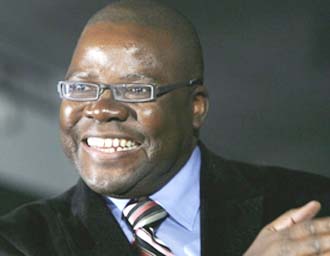


 ZIMBABWE’S National Budget has already come under stress from a salary hike agreed between government and civil servants last month, with indications several projects could suffer as resources are diverted towards salaries. The government’s salary bill amounted to US$2,6 billion last year, or 68 percent of the total budget which amounted to US$3,8 billion. It was not immediately clear to what level the recent salary increases would take the salary bill given that civil servants received varying thresholds depending on their grade, but the least paid had their salaries increased by US$54 to US$375 per month.
ZIMBABWE’S National Budget has already come under stress from a salary hike agreed between government and civil servants last month, with indications several projects could suffer as resources are diverted towards salaries. The government’s salary bill amounted to US$2,6 billion last year, or 68 percent of the total budget which amounted to US$3,8 billion. It was not immediately clear to what level the recent salary increases would take the salary bill given that civil servants received varying thresholds depending on their grade, but the least paid had their salaries increased by US$54 to US$375 per month.
Former finance minister Tendai Biti, who last year twice revised the 2013 National Budget downwards due to intensifying revenue pressures, declined requests for salary increases, saying there was no fiscal space for additional expenditure. In 2011 and 2012, public sector salary increases, which were marginal, crowded out spending in key areas. This resulted in fiscal stress, including the accumulation of domestic payments arrears, which necessitated significant adjustments to the 2012 budget in the second half.
The situation is likely to worsen this year, with reports suggesting that revenue is dwindling due to a worsening economic situation characterised by a liquidity crunch that has been abetted by an increasing trade deficit. Finance Minister Patrick Chinamasa’s US$4,2 billion budget for 2014 had no provision for salary increases, and with little or no budgetary support for the hike in civil servants incomes, government is expected to struggle for funding. Analysts warned that Chinamasa could be forced to revise his National Budget downwards due to an underperforming national economy, compounding government’s woes.
Reports have already indicated that the agreed salary increases were not factored into February salaries. Uniformed forces, who received their pay slips this week, told the Financial Gazette that the increment had not been effected as promised. The reviewed February salaries were to be back dated to January, according to a deal they struck with government.
A highly placed source within the Public Service Association revealed yesterday that Chinamasa had, at their meeting yesterday, advised that funds to meet civil servants salary increases will only be available in April.
Government currently has over 230 000 employees on its payroll. But there have been allegations that the government payroll has a lot of ghost workers. In 2009, government commissioned a payroll and skills audit by Ernst & Young, which submitted two reports in November 2010 and July 2011. The audit, it has been said, indicated that over 8 000 ghost workers could be receiving salaries every month from the cash-strapped government. At least 6 000 of these had been removed from the payroll by 2012, according to the International Monetary Fund (IMF).
Uniformed forces, who received their pay slips this week, told the Financial Gazette that the increment had not been effected as promised. The reviewed February salaries were to be back dated to January, according to a deal they struck with government.
Government has over the last five years spent an unsustainable 70 percent of its budget on salaries and wages there by crowding out capital projects. Public Service Minister Nicholas Goche, this week said he was not sure why the salaries had not been effected and promised to give a clear position after meeting Chinamasa and the chairman of the Public Service Commission, Mariyawanda Nzuwa.
Civil servants salaries are below the Poverty Datum Line. Chinamasa has expressed concern over the magnitude of employment costs in government. He noted: “Sadly, the unsustainable employment costs are largely on account of the huge salaries, allowances, and perks being paid to top management contrary to the corporate governance Framework for State Enterprises and Parastatals over principles of affordability, and sustainability.” The IMF has previously said government should retrench, but Chinamasa said this was not an option.